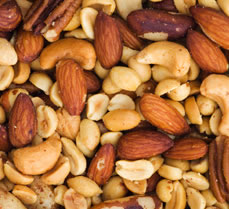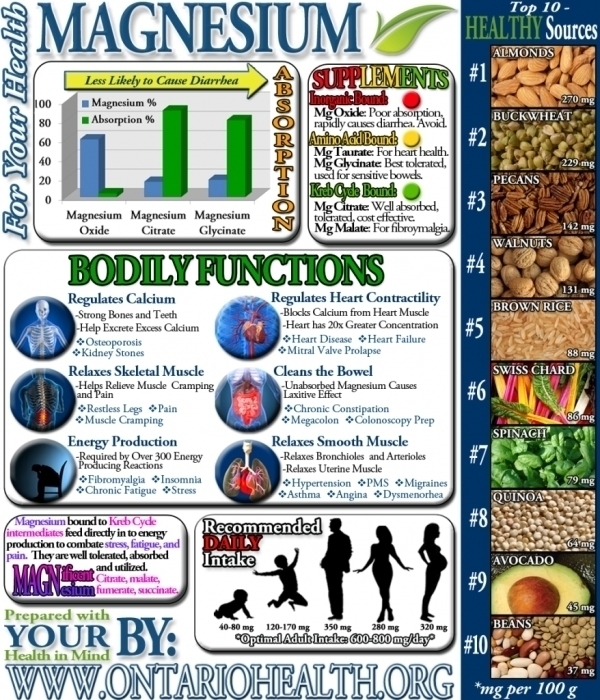Magnesium is an extremely important mineral to both your loss goals and your health. In fact, it’s the 4th most abundant mineral in your body and it’s constantly being depleted. Half of your magnesium is contained within your bones.
The rest is found in your cells and blood. It’s needed to carry out more than 300 processes and reactions in your body. A deficiency in magnesium could cause complications and problems.
Increasing your intake of magnesium is likely to have positive effects on your , but magnesium itself doesn’t cause loss. It’s not your typical loss supplement, since your typical loss supplement will work either by increasing metabolism due to containing stimulants or causing you to feel full due to containing appetite suppressants.
If it doesn’t do either of those things, how in the world can it help with loss? It helps in a variety of meaningful but subtle ways. Let’s go into more detail
Magnesium Affects Blood Sugar

Blood glucose (sugar) levels have a big impact on fluctuations. The steadier your blood sugar remains, the healthier you will be and the healthier your will be.
When your blood sugar spikes, insulin is released by your pancreas to help your cells take in the sugar where it can be stored as energy.
When glucose is stored for energy and not expended, it turns into fat. Blood sugar spikes and insulin surges also signal the release of cortisol – the belly fat hormone.
When your blood sugar spikes all the time, your body becomes resistant to insulin and more and more is needed. Constantly raised insulin levels also increase cortisol levels.
Magnesium helps you to maintain a steadier blood glucose level by improving the function of insulin. Adequate levels of magnesium discourage insulin resistance, making the amounts of insulin released by the pancreas more effective.
Magnesium Makes Other Nutrients More Accessible
This wonderful little mineral does a good job at helping your body better absorb other minerals too. Suffering from a magnesium deficiency leads to improper absorption of fats, carbohydrates and proteins.
Think this is a good thing?
Like you’ll be able to eat food and it’ll pass through you unused? Wrong. Your body needs the correct amount of fats, carbs and proteins to function properly.
When your body has adequate amounts of these nutrients, it will activate the enzymes that tell your brain your body has had enough to eat. It helps you feel satisfied, leading to reduced calorie intake.
Magnesium Gives You Better Sleep & More Energy

How does one mineral accomplish seemingly opposite effects? Well, as mentioned, magnesium is responsible for a number of processes and biochemical reactions. Falling short on this mineral leaves people tired but doesn’t allow them a deep, restful sleep.
Getting more magnesium (if deficient) can help you fall asleep easier, enjoy a higher quality sleep, and have the benefit of increased calm energy while awake. These are all necessary for weight loss, since the sleep deprived tend to weigh more (due to increased cortisol resulting from the lack of sleep) and the fatigued have less energy to use for resisting temptation and exercising.
Magnesium: The Great Stress Fighter
Did you know that one of the most common ways people react to stress is to eat more than they usually do? And guess what they eat? That’s right, crap foods… Disgustingly delicious, easy-to-overindulge-in comfort foods. Junk like chips or ice cream. No effort required fast foods. You get the idea.
Your adrenal glands will excrete adrenaline (also known as epinephrine or norepinephrine) whenever it feels stressed. For many of us, this happens way too often. Like any other part of your body, your adrenal glands can suffer from poor health.
Magnesium, though, is one of the supporters of healthy adrenal glands. Getting adequate amounts of this mineral make your adrenals less likely to overreact and flood your body with the stress hormone adrenaline.
And you already know how magnesium helps to control cortisol by helping us sleep better. Reduced amounts of stress hormones will do a world of good for your health and will help to whittle down your waistline, too.
https://youtu.be/8pI3nT-_kW8
Foods high in Magnesium
By now you’re sold on the benefits of magnesium and are ready to make sure you have adequate levels to keep your body functioning, right? Good!
Dietary sources of magnesium are bran cereals, all types of nuts, spinach, potatoes, beans, oatmeal, peanut butter, brown rice, bananas, and – oddly enough – chocolate milk. People also take Epsom salt baths to absorb magnesium through their skin.
Supplements are yet another option. If you choose the supplement route, look for magnesium chloride, magnesium lactate, or magnesium citrate on supplement labels. Avoid magnesium oxide as it isn’t as bioavailable (absorbable and usable by your body) as other sources.
Obviously, you should discuss your plans to get more magnesium with your doctor to make sure it doesn’t cause you any complications. Your doctor can also give you a personalized dosage recommendation tailored to your individual health profile.
Magnesium is a valuable nutrient that can help a great deal in helping you lose as long as you use your common sense along with it.
Please don’t go expecting a magnesium supplement to help you shed 20 lbs if you sit around all day eating cheeseburgers and fries. Take advantage of all magnesium has to offer, along with employing a healthier lifestyle as watch the pounds melt away.


